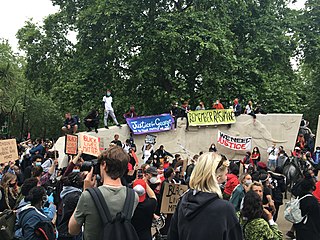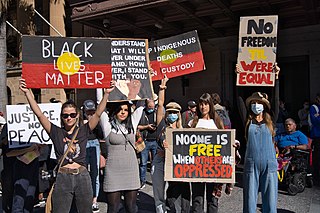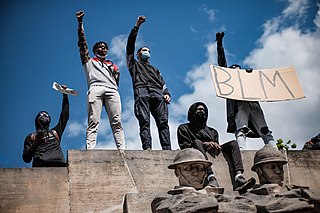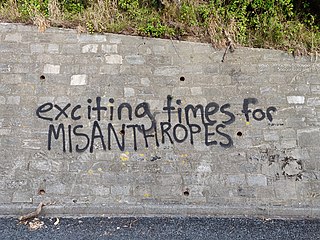The Polynesian Panther Party (PPP) was a revolutionary social justice movement formed to target racial inequalities carried out against indigenous Māori and Pacific Islanders in Auckland, New Zealand. Founded by a group of young Polynesians on 16 June 1971, the Panthers worked to aid in community betterment through activism and protest. Besides peaceful protests, they helped provide education, legal aid, and other social resources, such as ESOL classes and youth community programs. The group was explicitly influenced by the American Black Panther Party, particularly Huey Newton’s policy of black unity through his global call-to-action, as well as his ideology of intercommunalism. The movement galvanised widespread support during the Dawn Raids of the 1970s, and greatly helped contribute to the modern pan-Polynesian ethnic identity in New Zealand called Pasifika.

Black Lives Matter (BLM) is a decentralized political and social movement that aims to highlight racism, discrimination, and racial inequality experienced by black people and to promote anti-racism. Its primary concerns are police brutality and racially motivated violence against black people. The movement began in response to the killings of Trayvon Martin, Michael Brown, Eric Garner, and Rekia Boyd, among others. BLM and its related organizations typically advocate for various policy changes related to black liberation and criminal justice reform. While there are specific organizations that label themselves "Black Lives Matter", such as the Black Lives Matter Global Network Foundation, the overall movement is a decentralized network with no formal hierarchy. As of 2021, there are about 40 chapters in the United States and Canada. The slogan "Black Lives Matter" itself has not been trademarked by any group.

The George Floyd protests were a series of protests and demonstrations against police brutality that began in Minneapolis in the United States on May 26, 2020. The protests and civil unrest began in Minneapolis as reactions to the murder of George Floyd, a 46-year-old unarmed African American man, by city police during an arrest. They spread nationally and internationally. Veteran officer Derek Chauvin was recorded as kneeling on Floyd's neck for 9 minutes and 29 seconds; Floyd complained of not being able to breathe, but three other officers looked on and prevented passersby from intervening. Chauvin and the other three officers involved were later arrested. In April 2021, Chauvin was found guilty of second-degree murder, third-degree murder, and second-degree manslaughter. In June 2021, Chauvin was sentenced to 22+1⁄2 years in prison.

This is a list of George Floyd protests in the U.S. state of Oregon.

This is a list of George Floyd protests in Virginia. Following the murder of George Floyd by a police officer, protests spread from Minneapolis to other parts of the United States, including Virginia. Protests broke out in Richmond on the night of May 28 and spread to over 50 other cities over the following days.
This is a list of protests in New York following the murder of George Floyd in 2020.
This is a list of George Floyd protests in Connecticut, United States.

Following the murder of George Floyd, an unarmed black man in Minneapolis, Minnesota on May 25, 2020, protests erupted around the nation and world. Dozens of protests, several involving thousands of protesters have been held in New Jersey. Unlike in other areas of the country, protests have been mainly peaceful. This is attributed to relatively good community-police relations, memories of the race riots of 1967, and activist leadership maintaining focus on systemic racism. After protests in Trenton and Atlantic City grew violent on May 31, curfews were set for the first time. Residents of Atlantic City helped clean up damage after the protests turned destructive.
This is a list of protests in New Mexico related to the murder of George Floyd.
Individuals and organizations throughout the United States and the world responded to the murder of George Floyd and the subsequent protests and riots.

Protests were held across the United Kingdom following the murder of George Floyd, a 46-year-old African-American man, by a police officer in the United States on 25 May 2020. Immediately following his murder, protests and riots occurred in dozens of cities across the United States. Protests were staged internationally for the first time on 28 May, with a solidarity demonstration outside the United States Embassy in London. They took place during the UK COVID-19 pandemic.

Shortly after protests seeking justice for George Floyd, an African-American who was accidentally killed during a police arrest, began in the United States, people in Canada protested to show solidarity with Americans and to demonstrate against issues with police or racism in Canada. Vigils and protests of up to thousands of participants took place in all 10 provinces and all 3 territories of Canada.

Shortly after protests began in the United States in late May 2020 seeking justice for George Floyd, an African-American who was murdered during an arrest by Minneapolis police, people in Australia protested to show solidarity with Americans and the Black Lives Matter movement, as well as to demonstrate against issues with police brutality and institutional racism, racism in Australia, and Aboriginal deaths in custody. Vigils and protests of thousands of participants took place nationwide.

The murder of George Floyd on May 25, 2020, triggered a wave of protests throughout Tennessee in late May and early June 2020. These protests continued throughout the year.

Shortly after protests seeking justice for George Floyd, an African-American who was murdered during a police arrest, began in the United States, some people in Belgium protested to show solidarity with Americans protestors and to demonstrate against issues with police or racism. Vigils and protests of up to thousands of participants took place nationwide.

A bronze statue of Captain John Fane Charles Hamilton was installed for seven years, in Hamilton, New Zealand, from in 2013 until removal in June 2020. The settlement of Hamilton was named after Captain Hamilton, a Royal Navy officer who was killed in action during the Battle of Gate Pā.
There were several COVID-19 protests in New Zealand held during the period of COVID-19 restrictions from 2020 to 2022, where people protested the government's response to the COVID-19 pandemic in New Zealand, in particular the lockdown measures in place in March–May 2020, August 2020, and August–November 2021 and the later vaccine mandates. The protests have been largely condemned by members of parliament, as well as local city and regional councils. Fears were also raised about the protests increasing the spread of the virus.

Many artworks related to the Black Lives Matter movement were created in Portland, Oregon, United States, during local protests over the murder of George Floyd and other Black Americans. Oregon Arts Watch contextualized the artistic works, stating that a "whitewashed pre-COVID lens" on American life, which obscured systemic racism, had been "cracked", and describing artists' response to racial violence being brought into the public eye was a "marathon, not a sprint".

The COVID-19 pandemic in New Zealand has had far-reaching consequences on the country that went beyond the spread of the disease itself and efforts to eliminate it, including education, faith communities, Māori, mass gatherings, sports, recreation, and travel. In addition, there were several recorded cases of lockdown violations, leaks, and misinformation about the COVID-19 virus and vaccines.
















